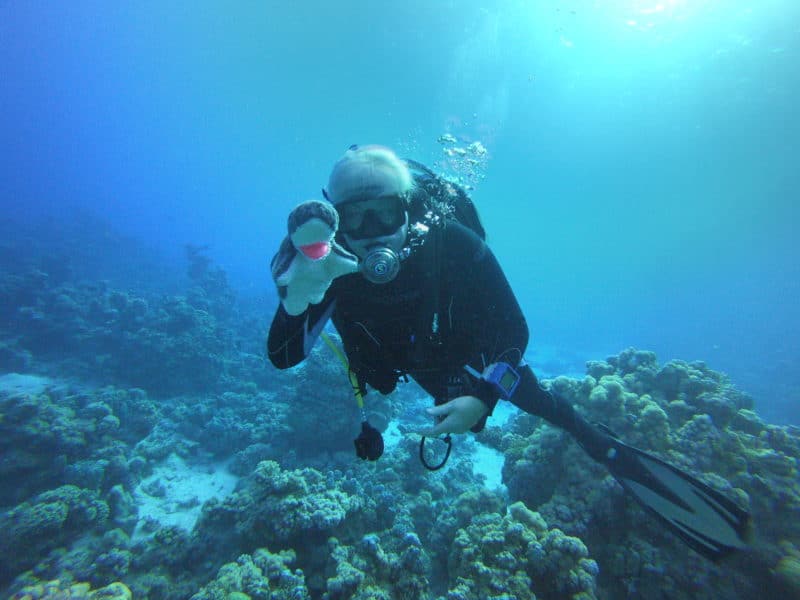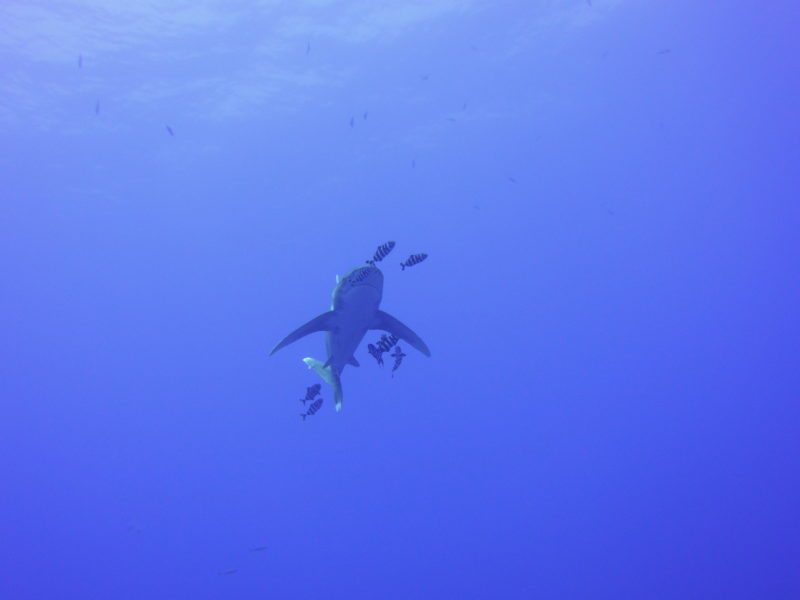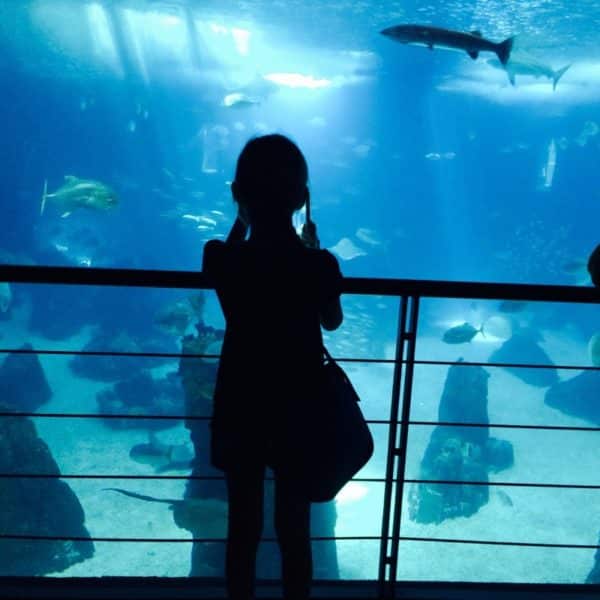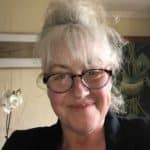Reading Ale’s first encounter with a pangolin made me remember some of my meetings with different creatures, how it affected me and influenced my work as an academic and psychotherapist; it usually changed me. Our growing awareness of the climate and biodiversity emergency can make us more aware of our relationship with the natural world, and as Ale talks about in her blog, it makes us think about what impact they have on us, as well as how we affect them.
I have always loved the sea. I wrote my psychotherapy dissertation on our relationship with saltwater, how we can both love and fear the underwater world. As a scuba diver, so many of my memorable encounters have been literally underwater. I worked for a few years in Egypt in the Red Sea taking groups of divers underwater to explore wrecked ships, coral reefs and seagrass gardens. Encounters with marine life are often unexpected, we are in their world, they are free to come and see us for a moment, and leave before we sometimes even realise they have been there. But they always leave me in awe, feeling that I have been visited rather than the other way around.
I have spent hours in desert-like seagrass beds searching for dugongs. I have seen ancient turtles the size of a small car hunkered down in the sand; I lay on the sand underwater at night and had two nurse sharks snuggle up either side of me and just lie there lazily before looking for their evening meal again. In thousands of dives I have only been bitten once, and it was completely my own fault, never wave your finger around in front of a fish – it could think it’s a snack.
When we think about our relationship with nature, we also need to remember that we are part of nature. Often we somehow separate ourselves off and treat the natural world as if it was ‘the other’ or ‘them’ in some way. When we do this we psychologically create what is called a ‘false dichotomy’. What this means is that we do not see ourselves as like ‘them’ or see ‘them’ as like us. This then means that we have no empathy for them, so we can treat animals badly, without care, and sometimes cruelly. This leads to a loss of connection, so we lose any sense of belonging to the natural world, and we can deny our interdependence.

Photo Credit: Caroline Hickman.
Sometimes psychologically it can be even stronger, we can project onto ‘them’ the parts of ourselves that we don’t like. A bit like when a group of people decides that another group is ‘the problem’ and is allowed to treat them badly, by being racist or sexist or homophobic for example. The next thing we do is then turn ‘them’ into what we would call psychologically ‘an object’. Now, this doesn’t mean that we think they are literally an object, but it means we do not see them as having feelings, or rights, of feeling pain or fear. So, we can then treat them in a harmful, exploitative and cruel way. And we don’t feel bad about this, because we have ‘objectified’ them. We have shut ourselves off from imagining how awful it might be for them.
What is behind this is the anthropocentric view of the world that many people hold. We see humans as more important or valuable than any other animals, and it can also mean that our survival is all that matters to us. One of the problems we have, however, is a growing realisation that we are actually dependent on nature for our own survival. We look for technological solutions to the virus, climate & biodiversity crisis, but did you know that a whale can pull 400,000 tons of carbon from the air every year, and that seagrass beds stores carbon 40 times faster than tropical forests? There are also natural solutions, and protecting biodiversity reduces the risk of pandemics.
So maybe in saving ‘them’ we are saving ourselves, maybe we need to rewild gardens and farms and grass verges, but also rewild a part of our own psyche as well. And maybe we should pay attention to those moments of connection with ‘the other’ that can be seen every day. By healing the divide between ‘them’ and ‘us’ – whether between black and white or between animal and human, that connection and empathy and realisation that we are dependent on each other to survive could help to change everything.

Photo Credit: Caroline Hickman.
I was hovering out in blue water away from the reef, watching the group of divers I was looking after as they explored a wrecked ship on the side of the reef. I was happy just ‘hanging out’ in blue water at a depth of about 20 metres, watching their bubbles as they rose up out of the shipwreck. I probably wasn’t thinking about much at all, I often slipped into a meditative dreamy state underwater when I was just hanging around like that, much easier than on land for me where everything can just be so busy sometimes!
Suddenly I just ‘felt’ something, a presence, I turned around in the water to find that a pair of bottlenose dolphins had ‘snuck up’ behind me and were hovering in the water a few feet away from me. Perfectly still in the water. Then I realised that they had a baby with them as well, he or she peeked out from behind one of the adults looking at me. I felt like I was the fish in the aquarium that the parents had brought their child to see. They were showing me to him or her. I was the strange creature. Then one of the adults moved closer to me within arms-length and tilted their head to one side, so I did the same. Then they started to roll and turn in the water and turn somersaults, always keeping an eye on me; I did the same. Whatever they did, I copied. But they most definitely led the game or dance. I was being played with; I was the creature being studied down there. It was amazing, and I loved it.

Photo Credit: Caroline Hickman.


